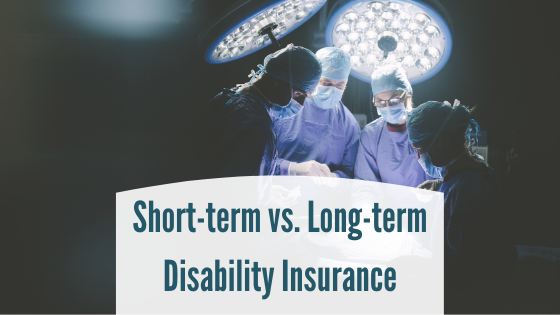
Many people think that the only form of insurance you need is homeowners insurance and auto insurance. Although it’s important to protect these assets, these aren’t the only things you should insure. It’s crucial as a dentist or physician to have disability insurance in the case of illness or an accident. The last thing you want is for something to happen to you that prevents you from working and not be insured.
Did you know that getting a disability is more common than passing away early? In fact, statistics show that individuals are 3 to 5 times more likely to have a disability than to have an early death. This is why it’s critical to have insurance in the event that something does happen to you.
So, what is disability insurance? This guide will teach you the basics of disability income insurance including the differences between short-term vs. long-term disability insurance.
Disability income insurance, or as we like to call it, income protection, is a vital tool that can provide income in case of an injury or illness. It may help prevent bankruptcies and foreclosures since disabilities cause more foreclosures than premature death.
It’s also wise to have these policies since typically you have limited employer sick leave. Disability policies are very valuable for the self-employed too since they aren’t entitled to employee benefits. Generally, disability income insurance will replace a portion of your income up to 60-70% of your after-tax salary. Most policies cover up to this percentage since they don’t want you to be on disability income insurance forever.
You can also go back to work part-time, once you’ve started to recover from your injury. Know that you’d still receive insurance payments, but they would be pro-rated. Some policies will only pay you if you’re fully disabled, while others have partial payments if your income slightly drops due to a disability.
Fortunately, most employers provide you with short- or even long-term disability insurance if you’re a full-time employee. Consider taking this route when deciding to purchase short-term vs. long-term disability insurance. (California, Hawaii, New Jersey, New York, and Rhode Island have mandated that employers provide at least short-term disability coverage for their employees.) When the premium of the policy is paid by an employer or individual on a pre-tax basis, then any benefit provided is taxable. Most employer plans are paid with pre-tax dollars causing any benefit to be taxable. In this case, you may want to consider supplementing your employer-provided coverage with a policy to cover the “tax gap” created by taxable benefit.
In addition to the “tax gap”, employer plans typically have a cap on the amount of monthly income benefit the group plan will cover. This can be significantly less than your income. Employer rules can vary with some paying the entire premium for short- and long-term group policies. Others pay for most of the premium, with the employee paying for the rest with after-tax dollars.
If you pay for disability policies with after-tax dollars, then your benefit won’t be taxable. Disability benefits can be partially taxed if the cost is split between you and your employer.
If you’re self-employed or don’t have access to an employer plan then you can purchase through an insurance broker or exchange. Be sure to use an independent insurance agent or financial advisor when selecting between short-term vs. long-term disability insurance. Independent professionals typically will have access to a wider variety of policies and won’t be tempted to sell you the one with the highest commission rate.
Short-term disability plans can last from 3-6 months and can start paying you 7-14 days after your injury or illness. The 7-14 day period is referred to as an elimination period, and it’s the gap between injury and payment. The 3-6 months is the benefit period. Short-term policies can cover up to 60-70% of your after-tax income.
The disability benefit isn’t taxable if you paid for premiums with after-tax dollars. Long elimination periods and shorter benefit times will make the policies less expensive.
Pros:
Cons
Long-term disability policies can replace up to 60-65% of your after-tax income until age 70. The most common long-term disability benefit period is age 65, which is typically the benefit period found in most employer plans. These plans also have much longer elimination periods that can be as much as 90-days or longer. The higher the elimination period, the lower the cost, all else being equal.
Pros:
Cons
“Waiting until you need your disability income insurance isn’t the time to learn how it works, do your homework ahead of a possible claim so that you can be prepared for the unexpected.” - John Dameron RICP®, CLTC
Many of our clients are young, healthy, fit, and are in their 30’s and 40’s. Most don’t think anything bad can happen to them. Until it does.
Dr. Smith* is one of our clients and works as a general surgeon. He takes care of his body and hasn’t even broken a bone. What he doesn’t realize is that slight injuries can prevent him from working. Surgeons need to have fine motor skills to perform intricate surgeries.
Unfortunately, Dr. Smith began having nerve issues and experienced various symptoms like numbness in his hands. Before this, he purchased a short-term policy, which replaced a good portion of his income while he recovered. Once he recovered most of his fine motor skills; he was still able to receive prorated benefits from his long-term disability coverage since he could only work part-time.
Dr. Smith isn’t the only one since many of our clients who are doctors and dentists have had similar experiences. These professionals are more susceptible to injury as they have an advanced skill set that requires detailed hand-eye coordination. Our team has discovered that cancer, arthritis, and nerve issues are the highest causes of disability claims among our client base.
One of the biggest factors to consider when selecting short vs. long term disability insurance is to ensure that your policy is non-cancelable guaranteed renewable. This means that your insurance company can’t cancel or alter your coverage unless you choose to do so.
It’s also important to evaluate riders or add on benefits for additional fees. There are many riders, but a few common ones include:
Future Insurability Option Rider: You can increase the amount of monthly disability coverage as your income increases, without medical underwriting. This can only be implemented before a disability occurs.
Cost of Living Adjustment Rider (COLA): This will let your benefits keep up with inflation if your disability lasts longer than 12 months.
Disability income insurance is often overlooked, but it can prevent bankruptcies and provide peace of mind. Most people are more prepared for an early death with life insurance, but they don’t realize that becoming disabled is much more common. Being able to maintain cash flow despite an illness or injury can help provide support for yourself and your loved ones.
You don’t have to know everything about disability policies but learning high-level information about short-term vs. long-term disability insurance can provide financial security.
*Dr. Smith is a real client whose name and specialty has been altered to protect privacy.
CRN202206-266292

John Dameron has been a financial planner and partner with Spaugh Dameron Tenny since 2002. With the help of the SDT team, John created a lecture series called Physicians Financial Focus, authored a book entitled The Residents and Fellows Financial Survival Guide, and has coached hundreds of physicians from residency/fellowship into practice. His expertise has also been featured on KevinMD.
For doctors and their spouses, the life insurance application process can feel daunting and invasive as you may endure answering very personal ...
Read More →Life Insurance Considerations for Doctors In Training September is Life Insurance Awareness Month (LIAM). How will you protect your biggest asset — ...
Read More →Since you were in medical school, it has probably been drilled into your head that you must have disability insurance. Your ability to earn an income ...
Read More →